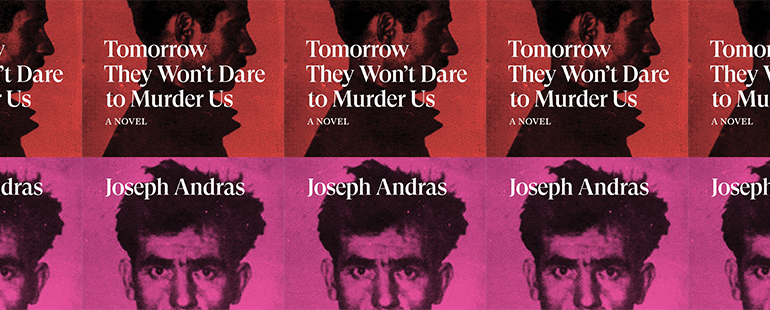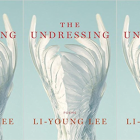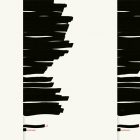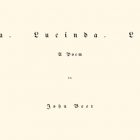Tomorrow They Won’t Dare to Murder Us by Joseph Andras

Tomorrow They Won’t Dare to Murder Us
Joseph Andras
Verso | February 23, 2021
When French colonizers invaded Algeria in the mid-nineteenth century, the violence and disease they brought into the region reduced the indigenous population by one-third. In 1945, after a century of colonial proliferation, French authorities and pied-noir militias murdered over one hundred Algerian demonstrators in the Sétif and Guelma massacre (settlers went on to slaughter close to thirty-thousand Algerians in subsequent attacks). In the following decades, the Algerian War—which eventually led to Algeria securing its independence—claimed over one and a half million Algerian lives and displaced roughly two million people. Of course, these death counts are all estimates; many victims were never identified.
This is the inescapable, haunting context of Joseph Andras’s Prix Goncourt-wining debut novel, Tomorrow They Won’t Dare to Murder Us, translated by Simon Leser, which is based on the true story of Fernand Iveton, a young pied-noir revolutionary who was arrested and executed for planting a bomb in a factory on the outskirts of Algiers during the Algerian War. Happily married and respected amongst his peers, Fernand is a pensive, sentimental type who ensures his political action never harms an innocent person. But after years of nonviolent politicking, Fernand is torn between the limits of peaceful protest and the allure of armed revolt. The French have persecuted or killed many of his friends and countrymen—how much longer can he idly stand by? By planting a bomb in an empty factory, Fernand thinks he can achieve the best of both worlds: commit a violent act without actually hurting anyone. To him, the bomb is “a symbol. Sabotage, in sum.”
The novel opens as Fernand waits to receive the bomb from a comrade. His meticulous planning is all for naught, though, when he is intercepted and detained by French authorities. In custody, he suffers unconscionable torture—electrodes placed on his neck, face, penis, and anus. By night his body is covered in burns and he can barely breathe. As Fernand riles in pain, the narration slips briefly into other perspectives: Hélène, his unsuspecting wife; Dijali and Jacqueline, Fernand’s comrades; and Jean, another comrade who tries to place a bomb in a police van. Back in the interrogation room, Fernand finally breaks and reveals the names of his colleagues, leading to a heartbreaking revelation about torture: “He distrusts words, now: he knows they can be torn from him by force and turned inside out like a glove.” A week passes and Fernand learns that he will be tried in military court and likely sentenced to death. Execution, however, seems far-fetched. The bomb did not detonate. No one died. Despite its fraught colonial history, “France is hardly some tyrant,” thinks Fernand. Even the state-appointed lawyers agree with him.
Flashbacks weave between the torture and courtroom scenes, many of which depict how Fernand and Hélène fell in love. Although these swift, romantic sections offer levity from the present-tense horrors, they mostly serve as spaces to flesh out Fernand’s ideology. “Arabs have been organizing for years to be heard, to win equality for all,” he tells Hélène. “But it’s like shouting in the desert . . . [Algerians were] burned alive with gasoline, crops pillaged, bodies thrown in wells . . . the army shooting at everything that moves, to crush dissent.” Fernand is distraught when considering the oppression of “him or his parents or his grandparents, doesn’t matter . . . Death is one thing but humiliation goes deeper, gets under the skin.” Although Hélène is well aware of her husband’s political passions and “suspects that he could, one day, radicalize further,” Fernand never told her of his plans to plant the bomb in order to protect her and her son.
Fernand most clearly articulates his political goals when engaging in a back and forth with the judge set to sentence him. “For our group, it was never a matter of destruction,” he announces in the courtroom, “or of making an attempt on anyone’s life. We were determined to draw the French government’s attention to the growing number of combatants fighting for greater social happiness in this land of Algeria.” Despite Fernand’s eloquence, the judge sentences him to death. In the following days, Fernand’s lawyers make an impassioned appeal to René Coty, the President of France, who recognizes “the courage of [Fernand’s] intentions and the element of charity in his motives.” Nonetheless, Coty denies the lawyers’ request because he is more concerned with stroking the sympathies of his constituents; most French citizens consider Fernand a deadly terrorist and, therefore, desire his execution. With his head held high and an internal assurance that his execution will lead to Algeria’s independence, Fernand accepts his sentence with Koestlerian resolve.
Complicating conventional Western perceptions of terrorism, Tomorrow They Won’t Dare to Murder Us subverts colonial morality and interrogates a philosophical dilemma that is still very much alive in our contemporary consciousness: how can Western powers torture, incarcerate, and execute “terrorists” without first reckoning with their own relentless, centuries-long terrorism? And who is to determine which side serves justice and which perishes? “History is cruel,” Fernand thinks as he prepares to die. Joseph Andras only seeks to set the record straight.



